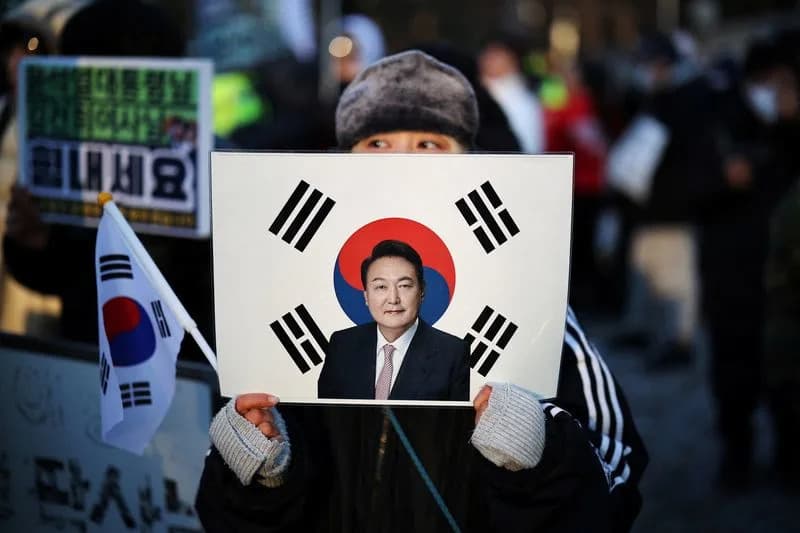Juan Ponce Enrile, 101, a central figure in Ferdinand Marcos's administration and widely described as the architect of martial law, has died after treatment for pneumonia. He later helped trigger the 1986 "People Power" uprising that ousted Marcos but subsequently aided the Marcos family's political comeback and served as Ferdinand Marcos Jr.'s chief legal counsel. Enrile never apologised for the martial law era, which Amnesty International says involved the abuse of tens of thousands, and he faced multiple arrests and graft charges late in life before recent dismissals and acquittals.
Juan Ponce Enrile, Architect of Marcos-era Martial Law and Key 'People Power' Figure, Dies at 101

Juan Ponce Enrile, the influential and controversial Philippine statesman widely regarded as the architect of Ferdinand Marcos's martial law, has died at the age of 101, his daughter said.
Enrile, who had been treated for pneumonia, died at home at 4:21 pm (0821 GMT) "surrounded by our family," Katrina Ponce Enrile wrote on Facebook, adding that there would be a public viewing.
From trusted adviser to polarising powerbroker
Harvard-educated and long a top adviser to Marcos, Enrile played a central role in implementing the 1972 declaration of martial law that suspended civil liberties and enabled widespread repression. As defence minister he was effectively the regime's second-most-powerful official, involved in decisions over arrests and detentions.
"We say goodbye to one of the most enduring and respected public servants our country has ever known," Ferdinand Marcos Jr. said in a statement, adding that Enrile "dedicated his life to serving the Filipino people, helping guide the country through some of its most challenging and defining moments."
That praise was not universal. Bonifacio Ilagan, who leads a group of former dissidents imprisoned during martial law, said his organisation had "no tears to shed" and that Enrile would be remembered "neither as a patriot nor a statesman, but as one of the chief architects and defenders of tyranny, repression, and corruption in the country."
Contested legacy
Enrile's record remains disputed. Amnesty International has estimated that Marcos's security forces killed, tortured, sexually abused, mutilated or arbitrarily detained tens of thousands of opponents; more than 11,000 victims have been officially recognised and compensated. Enrile never issued a formal apology for his role and publicly defended aspects of the martial law period, once saying, "It was operating well at least from 1972 all the way to 1975, but somehow along the way... a good beginning sours."
According to his memoir, Enrile was born Juanito Furagganan on February 14, 1924, the son of a widow and a prominent married lawyer; he later adopted his father's surname and became a respected attorney. Before becoming defence minister he served as customs chief and justice minister.
From coup plots to 'People Power'
By the early 1980s, wary of being sidelined by allies of Imelda Marcos, Enrile helped organise the Reform the Armed Forces Movement (RAM), a group of younger officers. The 1983 assassination of opposition leader Benigno "Ninoy" Aquino and widespread electoral fraud in 1986 intensified public outrage. When a planned coup was uncovered and its leaders faced arrest, Enrile and colleagues barricaded themselves at Manila's military headquarters and appealed to the public—millions responded, culminating in the "People Power" revolt that toppled Marcos, installed Corazon Aquino as president, and restored democratic governance.
Aquino briefly appointed Enrile defence minister, but he did not remain long in her cabinet.
Later life: politics, prosecutions and controversial comebacks
Enrile enjoyed a long political career as a senator and served as Senate president from 2008 to 2013. He was briefly detained in 1990 and 2001 over alleged coup involvement, and again in 2014 in connection with accusations of embezzling public funds tied to a major bribery scandal.
Citing his "fragile health," the Supreme Court granted him bail in 2015 so he could live at home. A special graft court dismissed the plunder (massive corruption) charges against him last year, and he was acquitted of remaining graft cases the month before his death.
In a further twist to his complex political trajectory, Enrile later aided the political rehabilitation of the Marcos family after their return from exile. Following Ferdinand Marcos Jr.'s victory in the 2022 presidential election, Enrile was named chief legal counsel to the president.
Enrile leaves a legacy marked by both pivotal influence on the Philippines' history and deep controversy over human rights abuses and corruption during the Marcos era.
Help us improve.

























